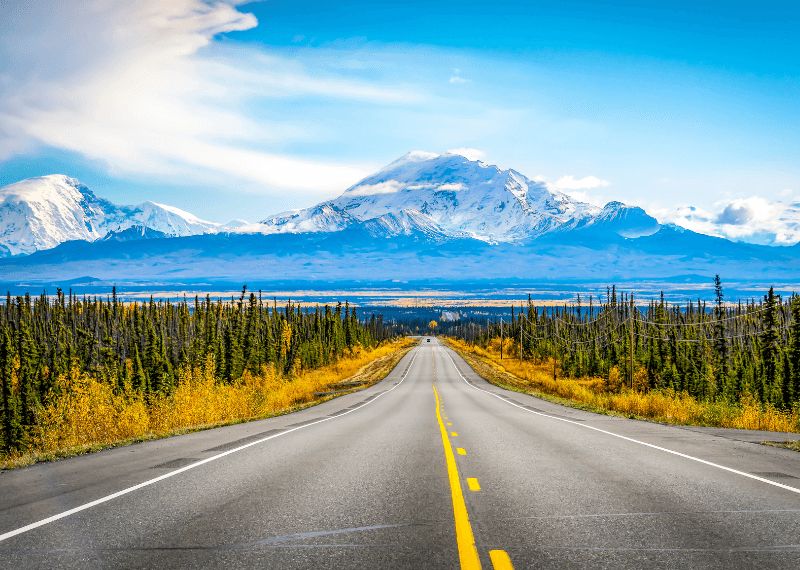This article is written to assist you in planning your family’s relocation with proper understanding of Alaska. We inform you of the challenges, realistics costs of living and more so you can make an educated decision.
Moving to Alaska: A Full On Guide
Alaska, is one of the most unique and different places to live in the United States. Whether you’re drawn to its natural beauty, adventurous lifestyle options, or simply want a change in life, relocating to Alaska is a big decision.
From the cost of moving to the challenges of living in the snowy state, here’s a full on user guide to help you navigate the process.
Why Move to Alaska?
For it’s beauty of course! Before dive into the practicalities, let’s look at why you might want to move to Alaska in the first place. Alaska offers the perfect backdrop for outdoor lovers, wildlife freaks, and those who need wide-open spaces.
Its vast mountains, neverending forests, and pristine lakes provide hiking, fishing, and even hunting opportunities. The state’s long, dark winters and endless summer days create a unique atmosphere that many people find alluring to raise a family.
The practical reasoning for your move:
- No State Income Tax: Alaska is one of the few states in the U.S. without a state income tax. If you are a big remote erner this is your spot.
- Permanent Fund Dividend: Each year, eligible residents receive a share of the state’s oil revenue. It is usually between $1,000 and $2,000 per person, which can help offset some of the living costs in Alaska.
- Outdoor Lifestyle: If you love nature and adventure, Alaska offers something that few other states can match. The landscape is as diverse as it is vast, with opportunities for activities like free snow skiing, kayaking, dog sledging, and wildlife trekking.
Costs of Moving to Alaska
Now that you are excited, lets remain practical. The cost of moving to Alaska varies depending on where you’re coming from, what items you bring, and how far you need to travel. Moving from the mainland U.S. to Alaska can average range from $2,500 to $10,000 or more depending on distance.
Breakdown of typical costs:
- Hiring a Moving Company: For a full-service move, including packing, transportation, and unloading, expect to pay between $4,000 and $9,000 for a long-distance move (2,000-3,000 miles). If you’re moving from the East Coast, the cost could be higher. Pricing Van Lines can get you to Alaska smarter.
- Self-Moving (Renting a Truck or Container): A more affordable option is to rent a moving truck or container. Renting a 25-foot moving truck will cost between $1,500 and $3,000, depending on the distance, insurance, and fuel costs. This means DIY style moving which can be a rel hassle.
- Shipping a Vehicle: If you’re bringing your car, shipping a vehicle to Alaska costs between $1,000 and $2,000, depending on the size of the car and the shipping company. Many families prefer to drive and enjoy the views whi,e their hoe gets delivered.
- Flights: Flights to Alaska vary greatly depending on where you’re coming from, with one-way flights typically ranging from $200 to $500 from major cities.
Costs of Living in Alaska
While Alaska offers certain perks like no state income tax, it’s important to note that the cost of living in the state is higher than in the lower 48 states, particularly for everyday expenses. Some fees are be much higher due to Alaska’s geographical location and limited supply of goods.
Home Sweet Home
The cost of housing in Alaska varies widely depending on the city or region. Cities like Anchorage and Fairbanks generally have higher housing costs, while smaller towns or rural areas may be more affordable but have less access to basic needs.
- Anchorage: As the largest city in Alaska, Anchorage has a average home price of around $350,000. Rent for a one-bedroom apartment in Anchorage typically ranges from $1,200 to $1,500 per month. A three-bedroom home can cost $2,000 to $2,500 per month.
- Fairbanks: Home prices in Fairbanks are slightly lower, with the avereage price for a home around $275,000 to buy. Rent for a one-bedroom apartment typically ranges from $1,100 to $1,400 per month.
- Rural Alaska: Housing can be harder to find in more remote areas, and prices can vary greatly. However, homes and apartments in smaller towns may cost less, with rent for a one-bedroom apartment ranging from $700 to $1,200 in some areas.
Utilities
The cost of utilities in Alaska is high, especially in the winter months when heating costs skyrocket.
- Electricity: The average cost of electricity in Alaska is about 22 cents per kilowatt-hour (kWh), which is higher than the national average of 14 cents. Heating costs will affect your electricity bill significantly in colder months.
- Heating: Heating in Alaska is typically provided by oil or natural gas. The cost of heating oil fluctuates, but on average, you spend between $2,000 and $3,500 annually for heating in a 2,000-square-foot home. Brrr.
- Internet: Internet costs are higher in Alaska due to the state’s remote location. On average, you can expect to pay around $100 to $150 per month for a standard internet connection. TV cable servies as well cost more.
Chow Down
Groceries in Alaska are generally more expensive than in the lower 48 states due to the cost of shipping food to remote locations. On average, you may pay 15-30% more for basic groceries.
- Milk: $3.50 to $5.00 per gallon
- Eggs: $2.50 to $4.00 per dozen
- Bread: $2.50 to $4.00 per loaf
- Fresh Produce: Vegetables like lettuce and tomatoes can cost $3 to $5 per item or pound, with some items being even more expensive in rural areas.
Getting Around
Due to the state’s size and limited road infrastructure, transportation in Alaska can be expensive.
- Gas: Gas prices in Alaska tend to be higher than the national average, ranging from $4.00 to $5.00 per gallon, depending on the region.
- Car Insurance: Car insurance rates in Alaska are about 10-15% higher than the national average, mainly due to snow and ice driving increased risks. Expect to pay between $1,200 and $2,000 annually for full coverage.
- Public Transportation: Public transportation is available in larger cities like Anchorage but very limited in smaller towns.
Frequently Asked Questions
Is it difficult to find a job in Alaska?
Not really but it is industry depending. Alaska’s economy is primarily driven by industries like oil, gas, tourism, fishing, and government services. Job opportunities vary depending on your field, but positions in healthcare, education, construction, and technical services are in demand.
The unemployment rate in Alaska hovers around 5-7%, slightly higher than the national average, but many Alaskan employers offer competitive salaries and benefits to attract workers.
What is the best time of year to move to Alaska?
The best time to move to Alaska is in the summer, particularly between May and September since the weather is milder, and daylight hours are longer. Thiss will make moving easier and more pleasant for you.
During the winter, the state experiences long periods of darkness, and temperatures can dip well below freezing, making moving much more difficult. Additionally, transportation options may be limited in remote areas during winter.
When should I use pro packers?
Professional packers are not a critical add on, but will work at crazy speeds to get all your items packed up safely. While you might get stuck sorting through old junk, they will have your entire home packed up and bubble-wrapped in no time.
If you are in a time crunch, in important work projects, or just want to feel like a queen, consider using a packing full service moving option.
How do I adjust to the long winters in Alaska?
Adjusting to Alaska’s long winters can be challenging, especially if you’re not used to cold, dark conditions. However, there are several ways to make the transition easier I will reccommend. Invest in quality winter clothing to stay warm and comfortable.
Embrace the outdoors with activities like skiing, snowshoeing, and ice fishing, which can make the dark months more enjoyable. Get a light therapy box to combat seasonal affective disorder (SAD) during the long winter nights.
Is Alaska an excellent place to retire for me and my wife?
Alaska can be an excellent place to retire, especially if you want a peaceful environment and love outdoor activities. However, the high cost of living and the relatively limited healthcare options in rural areas may be concerning. Many retirees live in Anchorage or Fairbanks, where services and amenities are more accessible in case needed.
Wrapping Up For The Best State
Moving to Alaska is a life-changing decision that will offer you access to a unique lifestyle and many benefits, but it also comes with challenges. The high cost of living, particularly in terms of housing and transportation, can be a shock to newcomers, the winter dark cold months aren’t simple, and the cold can be a challenge. If despite these things you are up for great views, ski adventures and more, then be off and on your way to Alaska with Pricing Van Lines. We will handle the hard part.




